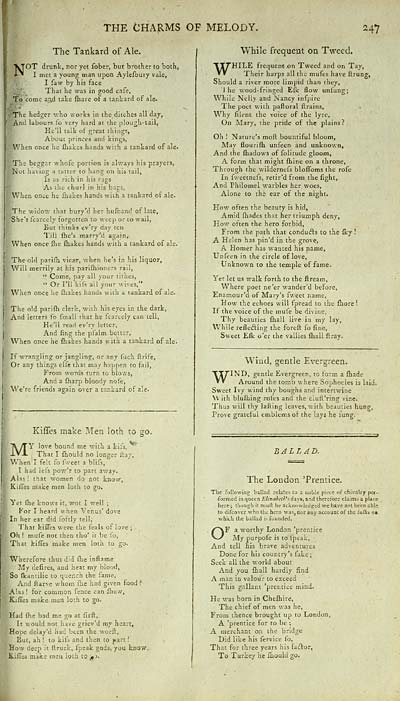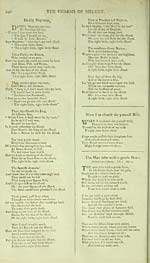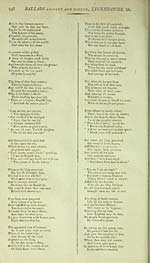Glen Collection of printed music > Printed text > Charms of melody, or, Siren medley
(235) Page 247 - Tankard of ale
Download files
Complete book:
Individual page:
Thumbnail gallery: Grid view | List view

THE CHARMS OF MELODY.
247
I
The Tankard of Ale.
NOT drunk, nor yet fober, but brother to bath,
I met a young man upon Aylefbury vale,
';; I faw by his face
■.&: That he was in good cafe,
'fo.'come aad take fhare of a tankard of ale.
:V'The hedger who works in the ditches all day.
And labours fo very hard at the plough-tail,
He'll talk o{ great things,
About princes and kings,
When once he fhakes hands with a tankard of ale.
The beggar whofe portion is always his prayers.
Not having a tatter to hang on his tail,
Is as rich in his rags
As the churl in his bags,
When once he fhakes hands with a tankard of ale.
The widow that bury'd her hufband of late.
She's fcarcely forgotten to weep or to wail.
But thinks ev'ry day ten
Till fhe's marry'd again,
When once flie ftiakes hands with a tankard of ale.
The old parifli vicar, when he's in his liquor.
Will merrily at his paiifliioners rail,
" Come, pay all your tithes,
" Or I'll kifs ail your wives,"
When once he ftiakes hands with a tankard of ale.
The old parifti clerk, with his eyes in the dark.
And letters fo fmall that he fcarcely can tell.
He'll read ev'ry letter,
And fing the pifalm better,
When once he fhakes hands vith a tankard of ale.
If wrangling or jangling, or any fuch ftrife.
Or any things elfe that may happen to fail,
From words turn to blows.
And a fharp bloody nofe,
We're friends again over a tankard of ale.
Kiffes make Men loth to cro.
o
MY love bound me with a kifs.
That I ftiould no longer ftay,
V/hen I fell fo iVeet a blifs,
I had lels pow'r to part away.
Alas ! that women do not know,
Kiffes nriake men loth to go.
Yet flie knows it, wot I well ;
For I heard when Venus' dove
In her ear did foftly tell.
That kiffes were the feals of love ;
Oh ! mufe not then tho' it be fo,
That kiffes make men loth to go.
Wherefore thus did fire inflame
My defires, and heat my blood,
So {kantilie to quench the fame.
And ftarve whom fhe had given food ?
Alas ! for common fence can fhev/,
Kiffes make men loth to go.
Had (he bad me go at firft.
It would not have griev'd my heart,
Hope delay 'd had been the worft.
But, ah ! to kifs and then to part !
How deep it itruck, fpeak gods, you know,
Kiffes make men loth, to f^).
While frequent on Tweed.
WHILE frequent on Tweed and on Tay,
Their harps all the mules have ftrung,
Should a river more limpid than they,
1 he wood-fringed Efk flow unfung;
While Nelly and Nancy infpire
The poet with paftoral ilrains.
Why filent the voice of the lyre,
On Mary, the pride of the plains ?
Oh ! Nature's moft bountiful bloom.
May flourifh unfeen and unknown.
And the fhadows of folitude gloom,
A form that might fhine on a throne.
Through the wildernefs bloffoms the rofe
In fweetnefs, retir'd from the fight.
And Philomel warbles her woes,
Alone to the ear of the night.
How often the beauty is hid,
Amid fliades that her triumph deny.
How often the hero forbid.
From the path that conducfls to the fky !
A Helen has pin'd in the grove,
A Homer has wanted his name,
Unfeen in the circle of love.
Unknown to the temple of fame.
Yet let us walk forth to the flream.
Where poet ne'er wander'd before,
Enamour'd of Mary's fweet name,
How the echoes will fpread to the fhore !
If the voice of the mule be divine,
Thy beauties fhall live in my lay.
While reilefting the foreft fo fine.
Sweet Efk o'er the vallies fhall ftray.
Wind, gentle Evergreen.
WIND, gentle Evergreen, to form a fhade
Around the tomb where Sophocles is laid.
Sweet Ivy wind thy boughs and intertwine
NV ith blufhing roles and the clull'ring vine.
Thus will thy lafling leaves, with beauties hung,
Prove grateful emblems of the lays he lung.
BALLAD.
The London 'Prentice.
The following ballad relates to a Doble piece of chivalry per-
■formed in queen Eliz,abetk'x daya, and therefore claims a place
, here; though it mud be acltnowledged we have nol been abh*
to difcover who the hero was, nor auy account of the fafls oa
which the ballad is founded.
OF a worthy London 'prentice
My purpofe is to fpeak,
And tell his brave adventures
Done for his country's fake ;
Seek all the world about
And you fhall hardly find
A man in valour to exceed
This gallant 'prentice mind.
He was bom in Chefhire,
The chief of men was he,
From thence brought up to London,
A 'prentice for to be ;
A merchant on the bridge
Did like his fervice fo.
That for tliree years his fadlor,
To Turkey he fhould go.
247
I
The Tankard of Ale.
NOT drunk, nor yet fober, but brother to bath,
I met a young man upon Aylefbury vale,
';; I faw by his face
■.&: That he was in good cafe,
'fo.'come aad take fhare of a tankard of ale.
:V'The hedger who works in the ditches all day.
And labours fo very hard at the plough-tail,
He'll talk o{ great things,
About princes and kings,
When once he fhakes hands with a tankard of ale.
The beggar whofe portion is always his prayers.
Not having a tatter to hang on his tail,
Is as rich in his rags
As the churl in his bags,
When once he fhakes hands with a tankard of ale.
The widow that bury'd her hufband of late.
She's fcarcely forgotten to weep or to wail.
But thinks ev'ry day ten
Till fhe's marry'd again,
When once flie ftiakes hands with a tankard of ale.
The old parifli vicar, when he's in his liquor.
Will merrily at his paiifliioners rail,
" Come, pay all your tithes,
" Or I'll kifs ail your wives,"
When once he ftiakes hands with a tankard of ale.
The old parifti clerk, with his eyes in the dark.
And letters fo fmall that he fcarcely can tell.
He'll read ev'ry letter,
And fing the pifalm better,
When once he fhakes hands vith a tankard of ale.
If wrangling or jangling, or any fuch ftrife.
Or any things elfe that may happen to fail,
From words turn to blows.
And a fharp bloody nofe,
We're friends again over a tankard of ale.
Kiffes make Men loth to cro.
o
MY love bound me with a kifs.
That I ftiould no longer ftay,
V/hen I fell fo iVeet a blifs,
I had lels pow'r to part away.
Alas ! that women do not know,
Kiffes nriake men loth to go.
Yet flie knows it, wot I well ;
For I heard when Venus' dove
In her ear did foftly tell.
That kiffes were the feals of love ;
Oh ! mufe not then tho' it be fo,
That kiffes make men loth to go.
Wherefore thus did fire inflame
My defires, and heat my blood,
So {kantilie to quench the fame.
And ftarve whom fhe had given food ?
Alas ! for common fence can fhev/,
Kiffes make men loth to go.
Had (he bad me go at firft.
It would not have griev'd my heart,
Hope delay 'd had been the worft.
But, ah ! to kifs and then to part !
How deep it itruck, fpeak gods, you know,
Kiffes make men loth, to f^).
While frequent on Tweed.
WHILE frequent on Tweed and on Tay,
Their harps all the mules have ftrung,
Should a river more limpid than they,
1 he wood-fringed Efk flow unfung;
While Nelly and Nancy infpire
The poet with paftoral ilrains.
Why filent the voice of the lyre,
On Mary, the pride of the plains ?
Oh ! Nature's moft bountiful bloom.
May flourifh unfeen and unknown.
And the fhadows of folitude gloom,
A form that might fhine on a throne.
Through the wildernefs bloffoms the rofe
In fweetnefs, retir'd from the fight.
And Philomel warbles her woes,
Alone to the ear of the night.
How often the beauty is hid,
Amid fliades that her triumph deny.
How often the hero forbid.
From the path that conducfls to the fky !
A Helen has pin'd in the grove,
A Homer has wanted his name,
Unfeen in the circle of love.
Unknown to the temple of fame.
Yet let us walk forth to the flream.
Where poet ne'er wander'd before,
Enamour'd of Mary's fweet name,
How the echoes will fpread to the fhore !
If the voice of the mule be divine,
Thy beauties fhall live in my lay.
While reilefting the foreft fo fine.
Sweet Efk o'er the vallies fhall ftray.
Wind, gentle Evergreen.
WIND, gentle Evergreen, to form a fhade
Around the tomb where Sophocles is laid.
Sweet Ivy wind thy boughs and intertwine
NV ith blufhing roles and the clull'ring vine.
Thus will thy lafling leaves, with beauties hung,
Prove grateful emblems of the lays he lung.
BALLAD.
The London 'Prentice.
The following ballad relates to a Doble piece of chivalry per-
■formed in queen Eliz,abetk'x daya, and therefore claims a place
, here; though it mud be acltnowledged we have nol been abh*
to difcover who the hero was, nor auy account of the fafls oa
which the ballad is founded.
OF a worthy London 'prentice
My purpofe is to fpeak,
And tell his brave adventures
Done for his country's fake ;
Seek all the world about
And you fhall hardly find
A man in valour to exceed
This gallant 'prentice mind.
He was bom in Chefhire,
The chief of men was he,
From thence brought up to London,
A 'prentice for to be ;
A merchant on the bridge
Did like his fervice fo.
That for tliree years his fadlor,
To Turkey he fhould go.
Set display mode to: Large image | Transcription
Images and transcriptions on this page, including medium image downloads, may be used under the Creative Commons Attribution 4.0 International Licence unless otherwise stated. ![]()
| Special collections of printed music > Glen Collection of printed music > Printed text > Charms of melody, or, Siren medley > (235) Page 247 - Tankard of ale |
|---|
| Permanent URL | https://digital.nls.uk/91432091 |
|---|---|
| Description | Also: Kisses make men loth to go. Also: While frequent on Tweed. Also: Wind, gentle Evergreen. Also: The London 'prentice. |
| Description | Scottish songs and music of the 18th and early 19th centuries, including music for the Highland bagpipe. These are selected items from the collection of John Glen (1833 to 1904). Also includes a few manuscripts, some treatises, and other books on the subject. |
|---|
| Description | The Glen Collection and the Inglis Collection represent mainly 18th and 19th century Scottish music, including Scottish songs. The collections of Berlioz and Verdi collected by bibliographer Cecil Hopkinson contain contemporary and later editions of the works of the two composers Berlioz and Verdi. |
|---|

